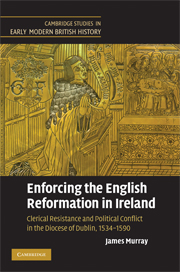 Enforcing the English Reformation in Ireland
Enforcing the English Reformation in Ireland Book contents
- Frontmatter
- Contents
- List of Tables
- Acknowledgements
- List of Abbreviations
- Note on Conventions
- Titles in the Series
- Introduction
- 1 ‘Handmaid’ of the English Church: the diocese of Dublin on the eve of the Reformation
- 2 Faithful Catholics of the English nation: patriotism, canon law and the corporate clergy
- 3 Rebellion and supremacy: Archbishop Browne, clerical opposition and the enforcement of the early Reformation, 1534–40
- 4 ‘God's laws and ours together’: Archbishop Browne, political reform and the emergence of a new religious settlement, 1540–2
- 5 The rise and fall of the viceroy's settlement: property, canon law and politics during the St Leger era, 1542–53
- 6 Archbishop Dowdall and the restoration of Catholicism in Dublin, 1553–5
- 7 Rejuvenation and survival: the old religion during the episcopacy of Hugh Curwen, 1555–67
- 8 Archbishop Loftus and the drive to protestantise Dublin, 1567–90
- Afterword
- Appendix 1 The division of administrative responsibilities between the two Dublin cathedrals
- Appendix 2 The parishes of the diocese of Dublin, 1530–1600
- Bibliography
- Index
4 - ‘God's laws and ours together’: Archbishop Browne, political reform and the emergence of a new religious settlement, 1540–2
Published online by Cambridge University Press: 28 July 2009
- Frontmatter
- Contents
- List of Tables
- Acknowledgements
- List of Abbreviations
- Note on Conventions
- Titles in the Series
- Introduction
- 1 ‘Handmaid’ of the English Church: the diocese of Dublin on the eve of the Reformation
- 2 Faithful Catholics of the English nation: patriotism, canon law and the corporate clergy
- 3 Rebellion and supremacy: Archbishop Browne, clerical opposition and the enforcement of the early Reformation, 1534–40
- 4 ‘God's laws and ours together’: Archbishop Browne, political reform and the emergence of a new religious settlement, 1540–2
- 5 The rise and fall of the viceroy's settlement: property, canon law and politics during the St Leger era, 1542–53
- 6 Archbishop Dowdall and the restoration of Catholicism in Dublin, 1553–5
- 7 Rejuvenation and survival: the old religion during the episcopacy of Hugh Curwen, 1555–67
- 8 Archbishop Loftus and the drive to protestantise Dublin, 1567–90
- Afterword
- Appendix 1 The division of administrative responsibilities between the two Dublin cathedrals
- Appendix 2 The parishes of the diocese of Dublin, 1530–1600
- Bibliography
- Index
Summary
The fall of Thomas Cromwell in June 1540 has traditionally been viewed by historians as a watershed in George Browne's episcopate. It is thought to have closed the active phase in his career as a reformer, and to have marked the beginning of a period of quiescence that would last until at least the end of Henry VIII's reign. On first sight this judgement seems plausible for, in the aftermath of his master's demise, the archbishop not only desisted from the aggressive enforcement campaigns that he had previously waged against his clergy in support of the Henrician Reformation, but his voice was also silenced in the historical record because he was left without an influential English patron with which to correspond. The Browne of the 1540s was certainly a less vocal and controversial figure than the ardent activist of the 1530s.
Yet the case for the quiescent Browne has generally been overstated. The prevailing image of the archbishop that it has given rise to – that of a ‘spent force’ who, bereft of Cromwell's protection, was left exposed to the forces of a gathering conservative religious reaction, or who was cast into the political wilderness because his brand of authoritarian religious reform did not fit in with the ‘liberal’ approach favoured by the new lord deputy, Sir Anthony St Leger – has tended to obscure the reality of his public life after 1540.
- Type
- Chapter
- Information
- Enforcing the English Reformation in IrelandClerical Resistance and Political Conflict in the Diocese of Dublin, 1534–1590, pp. 125 - 158Publisher: Cambridge University PressPrint publication year: 2009


